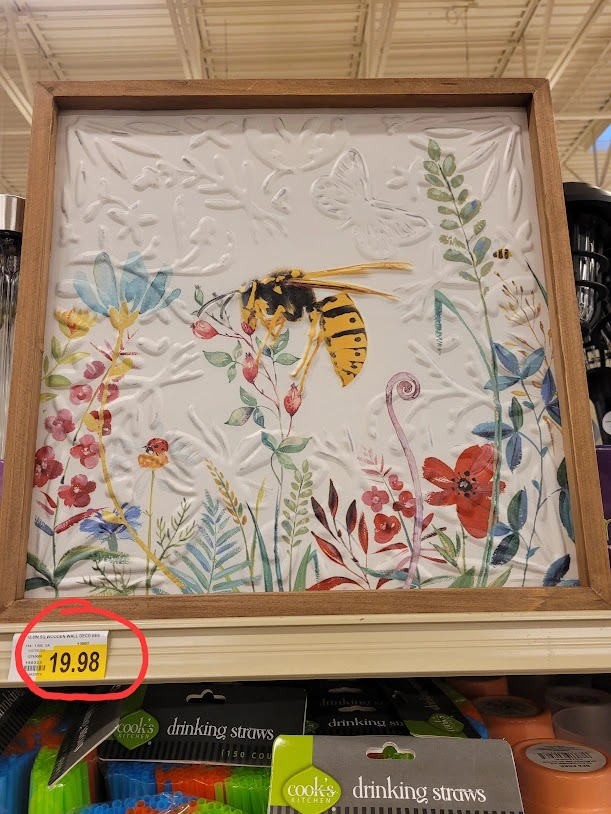Who wants to never see another summer because everyone died of starvation?
Me, humanity sucks
My old neighbour had one of those kebab shop bug zapper lights which she hung outside and ran all day and all night. I couldn’t sit out because the sound of insects being disassembled was too much for me to cope with.
I have a neighbor 3 doors down who hangs 2 off their deck.
I absolutely hate them for it.
It’s one of the many ways I know that as a species we’re fucked
Not sure if joking or not
Not, unfortunately
They make silent traps that allow you to let them all go. I don’t really get the zappers.
This is the kind of garbage I would expect AI to write.
The bees are fine, the wasps are shitty. Especially if you’re allergic to their stings.
If you’re allergic to bees does that make you allergic to wasps too?
Possibly. People that have allergic reactions to venomous stings can see it for multiple insects, though it’s not common. The only way to know is testing, by whacking a stick on the nests of different wasp species and taking note if any make you anaphylactic. If you’re all good, you can be more assured it’s just bees, but nothing’s 100% certain until you aggravate insects with a stick and test.
No, i dont think so. They are different. I think wasp stings are slightly alkaline, and bee stings are acidic. They need different treatments.
So wasps inject you with stuff too? I always figured it was just bees since they leave their butt behind. Wasps can sting multiple so they hold on to their butt and made me assume they just stabbed you but didn’t inject anything
I looked this up after typing a response to make sure I wasn’t mistaken, but its only honey bees that die when they string you
From google “First off, male bees in any species cannot sting as only females have the bodily anatomy to do so. Secondly, only the honey bee can die after stinging, this is due to the honey bee’s stinger. A honey bees stinger is made up of two barbed lancets, meaning when they sting, the stinger cannot be pulled out again.”
I didnt realise that the worker bees were female! Male bees are good for nothing but breeding. They cant even sting. Bloody layabouts!
I recently read somewhere that it’s actually just very few bee species that die after stinging, among them honeybees. They have a barbed stinger that gets stuck while most bees have flat stingers and can sting repeatedly.
¿BEES?
GOB’s not on board.
Grand Old Bee’s?
No. Tired of people
German has a word for it: Insektensterben
Of course German has a word for it! I did some bee research a long while back and we used to stick a tiny bit of numbered card on bees to track them. That has a German word as well, something like opalithplatchen.
What kind of language has a separate word for a tiny bit of numbered card that you stick on a bee?
It’s literally just that the language uses compound words constructed on the spot, as opposed to compound phrases. When you say “insect death”, German grammar just dictates that if it’s written without prepositions as “insect death” and not “the death of insects”, you have to write it in one word.
The same works in Hungarian as well. “The death of insects” would be “a rovarok halálozása”, while “insect death” has to be written as “rovarhalálozás”. Every compound phrase without a preposition to clarify the relationship of the words becomes a compound word.
Actually, Hungarian is even worse, because prepositions and some other stuff also become suffixes, and are thus attached to the word. So the phrase “happening at the time when insect death is caused” can be translated word for word as “a rovarok halálának okozásának idejében történő”, but it is equally right, and more succinct to use the adjective “rovarhaláloztatáskori”.
Amazing, thank you for that. There’s so much that’s fascinating in linguistics!
I’m sure you’re referring to these Opalithplättchen, aren’t you?
Impressive that you could remember the name. I’m German and had to look it up since I never heard about Opalith before.
Those are the ones! It’s quite a distinctive word so must have stuck in my head!
Is it a bee or a wasp?
In that picture? It’s a bee, contemplating leaping from the edge and ending it all after reading that article


That’s definitely a fucking wasp. Overpriced as well.
if you’re buying “art” at the grocery store, then you are exactly the target market for this $20 not-bee





